

Connectivism & The PLN: Give a Little to Get a Little ... One of the principles of connectivism is that you share.

You offer your knowledge, skills, abilities, talents, materials, resources to someone else, free of charge. For nothing in return, you give it away. Now, a true capitalist would smell something fishy in this idea. As a matter of fact, it would not be unusual to hear something like, “There’s something rotten in the state of Denmark.” Like I said, fishy. We sell things. So, let me say up front, I’m a capitalist, and a consumer. Having said that, I do draw your attention to another option, entirely viable, and entirely up to you.
I want to give an example of what being connected to you, my unseen and unknown friend(s) out there in Digital Wonderland, what your connection means to me. A list of connectivist MOOCs. Non-linguistic model of Connectivism, Commuties of Practice, and Personal Learning Environments. What does teaching for meaningful learning mean. Connectivism maps to understanding. Connectivism - The ADP Center for Teacher Preparation & Learning Technologies. Some reflections on MOOC. Apocalypse: The Network Event Horizon. Connectivism - my learning tree. Connectivism and Ideology Too. I'm still troubled by some of the claims that James Berlin makes in Rhetoric and Ideology in the Writing Class, but I think I prefer to start with what makes sense to me.
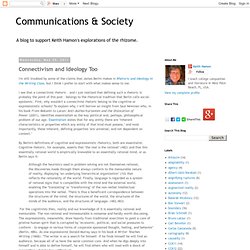
I see that a connectivist rhetoric – and I just realized that defining such a rhetoric is probably the point of this post – belongs to the rhetorical tradition that Berlin calls social-epistemic. First, why wouldn't a connectivist rhetoric belong to the cognitive or expressionistic schools? To explain why, I will borrow an insight from Saul Newman who, in his book From Bakunin to Lacan: Anti-Authoritarianism and the Dislocation of Power (2001), identifies essentialism as the key political and, perhaps, philosophical problem of our age. Essentialism states that for any entity there are "inherent characteristics or properties which any entity of that kind must possess," and most importantly, these inherent, defining properties "are universal, and not dependent on context.
" Connectivism - The full wiki. Connectivism: is there a learning hurdle ahead? Connected Learning Infographic. Connectivism: Connecting with George Siemens. Connectivism: Connecting with George Siemens. Cybergogue: Media and Technology Theory. MOOC Mythbuster – What MOOC’s are and what they aren’t. Connectivism in Practice — How to Organize a MOOC. MOOC Mythbuster – What MOOC’s are and what they aren’t. Massive Open Online Conferences? - Green Conduct. Massive Open Online Conferences? - Green Conduct. My eBooks ~ Stephen's Web. Half an Hour: New Forms of Assessment: measuring what you contribute rather than what you collect. Terry Anderson's Presentation - Follow the Sun Online Conference. Coursera, or Socrates was not a Content Provider: The University of Toronto and Coursera Agreement.
Cybergogue: A Critique of Connectivism as a Learning Theory. Embracing Uncertainty and the strange problem of habituation. Connectivism - Nik Peachy. Connectivism for EFL Teachers: A Theory of Learning For A Digital Age: Thomas Baker: Amazon.com: Kindle Store. Connectivism for EFL Teachers: A Theory of Learning For A Digital Age eBook: Thomas Baker: Kindle Store. Connective Learning: Challenges for Learners, Teachers, and Educational Institutions. By Claude Almansi Editor, Accessibility Issues ETCJ Associate Administrator The International Review of Research in Open and Distance Learning (IRRODL) has dedicated a special issue to “Connectivism: Design and Delivery of Social Networked Learning” (March 2011), edited by George Siemens (Athabasca University, Canada) and Grainne Canole (Open University, UK).
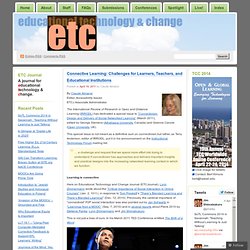
This special issue is not meant as a definitive sum on connectivism but rather, as Terry Anderson, editor of IRRODL, put it in his announcement on the Instructional Technology Forum mailing list: … a challenge and request that we spend more effort into trying to understand if connectivism has approaches and delivers important insights and practical designs into the increasing networked learning context in which we function. Learning is connective This is not just a bias of ours. Almost half a millennium earlier, Pierre Eyquem, seigneur de Montaigne, decided that his baby son Michel should learn Latin. An Italian MOOC Conclusion. Connectivism and Organizations. #fts12 Connectivism – curated by Susan Bainbridge. Connectivism and Connective Knowledge: Essays on meaning and learning networks. What Does Connectivism Mean for Education?
The theory of Connectivism provides new insight into what it means to facilitate learning in the 21st Century.
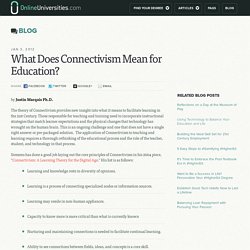
Those responsible for teaching and training need to incorporate instructional strategies that match learner expectations and the physical changes that technology has wrought on the human brain. Connectivism. Co-Constructvism and Connectivism. Connectivism and Social Learning in Practice. Research publications on Massive Open Online Courses and Personal Learning Environments. People interested in Massive Open Online Courses will probably be aware of the research by Helene Fournier and me on Personal Learning Environments and MOOCs.
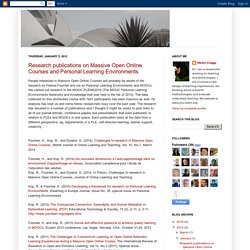
We carried out research in the MOOC PLENK2010 (The MOOC Personal Learning Environments Networks and Knowledge that was held in the fall of 2010). The data collected on this distributed course with 1641 participants has been massive as well. Its analysis has kept us and some fellow researchers busy over the past year.
The research has resulted in a number of publications and I thought it might be useful to post links to all of our journal articles, conference papers and presentations that were published in relation to PLEs and MOOCs in one space. Each publication looks at the data from a different perspective, eg, requirements in a PLE, self-directed learning, learner support, creativity. Kop, R. (2012) The Unexpected Connection: Serendipity and Human Mediation in Networked Learning. #Change11 Farewell to you all.
#Change11 “One small step for man, a giant leap for mankind” – Is that the MOOC movement? OracleDaily » What Lies Beneath: Some Thoughts on MOOCs’ Tech Infrastructure. Creating the Connectivist Course. When George Siemens and I created the first MOOC in 2008 we were not setting out to create a MOOC.
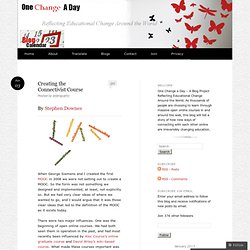
So the form was not something we designed and implemented, at least, not explicitly so. But we had very clear ideas of where we wanted to go, and I would argue that it was those clear ideas that led to the definition of the MOOC as it exists today. There were two major influences. One was the beginning of open online courses. We had both seen them in operation in the past, and had most recently been influenced by Alec Couros’s online graduate course and David Wiley’s wiki-based course. The other major influence was the emergence of massive online conferences. We set up Connectivism and Connective Knowledge 2008 (CCK08) as credit course in Manitoba’s Certificate in Adult Education (CAE), offered by the University of Manitoba. What made CCK08 different was that we both decided at the outset that it would be designed along explicitly connectivist lines, whatever those were.
A Repository of Papers on Connectivism. Connectivism and Connective Knowledge: Essays on meaning and learning networks. Transformational Adult Learning. Open education, open source, and the dilemma over e-textbooks. Are we at the crossroad in Higher Education? EduSkills » Connectivism. “The whole is more than the sum of its parts”.
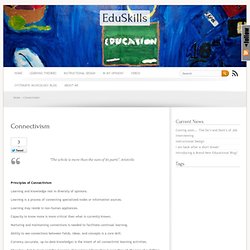
Connectivism with Some Restraint. Some rights reserved by PhOtOnQuAnTiQuE Connectivism is a learning theory created by George Siemens and written about in his article “Connectivism: A Learning Theory for the Digital Age”.
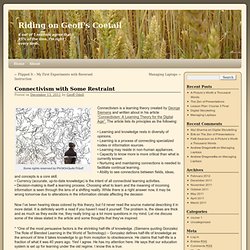
The article lists its principles as the following: • Learning and knowledge rests in diversity of opinions. • Learning is a process of connecting specialized nodes or information sources. • Learning may reside in non-human appliances. • Capacity to know more is more critical than what is currently known • Nurturing and maintaining connections is needed to facilitate continual learning. • Ability to see connections between fields, ideas, and concepts is a core skill. • Currency (accurate, up-to-date knowledge) is the intent of all connectivist learning activities. • Decision-making is itself a learning process. Choosing what to learn and the meaning of incoming information is seen through the lens of a shifting reality. . * “One of the most persuasive factors is the shrinking half-life of knowledge. Connectivism and Global Collaboration in Education.
Connectivism - XMind - Social Brainstorming and Mind Mapping. Connectivism and Personal Learning. All Hands on Deck - Goldilocks and the 3 MOOCs. Interview with George Siemens - LE@D, Universidade Aberta. Dr. George Siemens: “The Meaning of Connectivism for Learning Design” Open Social Learning: Connectivism, As Practiced By A Teacher of English as a Foreign Language. Connectivism. How I use connectivism in my learning and training. Connectivism & Connective Knowledge. 2020 Teacher Model. The Connectivist Approach Applied to Research - Stephen Downes. Connectivism and Transculturality. Thoughts on EduMOOC topics: My Educational Philosophy. #cck11: Connectivism and Social Constructivism – what’s the difference?
Get Regular Update on Connectivism. Why #Connectivism is not a Learning Theory. George Siemens - Connectivism: Socializing Open Learning. Teaching as transparent learning « Connectivism. Connectivism. Popplet. Who is the conscience of the global brain? You can listen to the 25 minute cybercrime program as a podcast from the Business21C site.
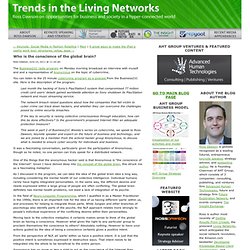
Here is the description of the program: Last month the hacking of Sony’s PlayStation3 system that compromised 77 million credit card users’ details gained worldwide attention as Sony shutdown its PlayStation network and music streaming service.The network breach raised questions about how the companies that fall victim to cyber crime can track down hackers, and whether they can overcome the challenges posed by online security breaches.If the key to security is raising collective consciousness through education, how can this be done effectively? Is the government’s proposed Internet filter an adequate protection measure? It was a fascinating conversation, particularly given the participation of Anonymous, though as he noted, no one person can truly speak for a distributed network.
One of the things that the anonymous hacker said is that Anonymous is “the conscience of the Internet”. Analytics_Milan. On Connectivism… « Wonder-FULL-World - edustange's posterous. Learning Analytics: research discipline and domain of practice - Learning and Knowledge Analytics. Connectivism: Connecting with George Siemens.pdf. Connectivism: Connecting with George Siemens.pdf.